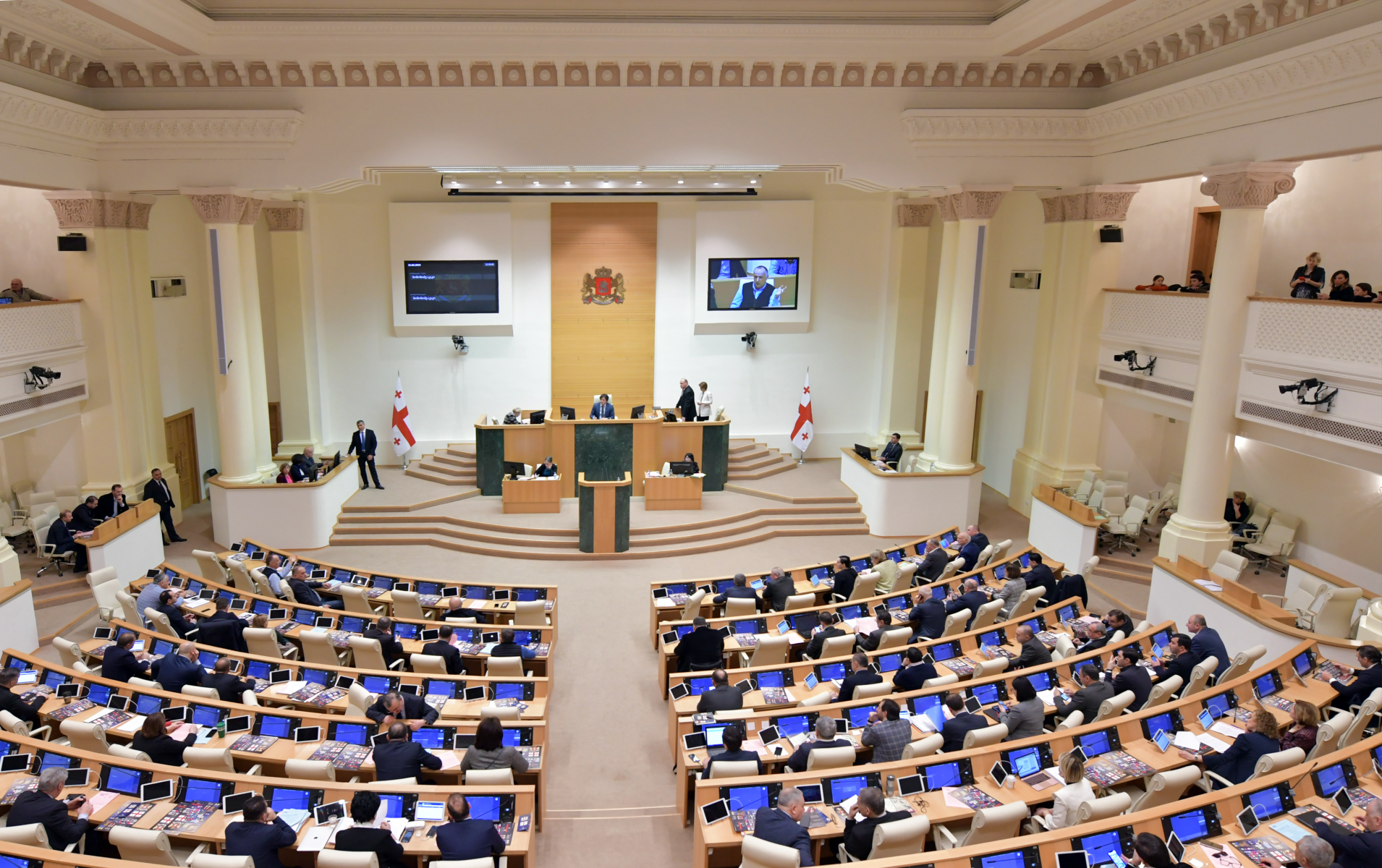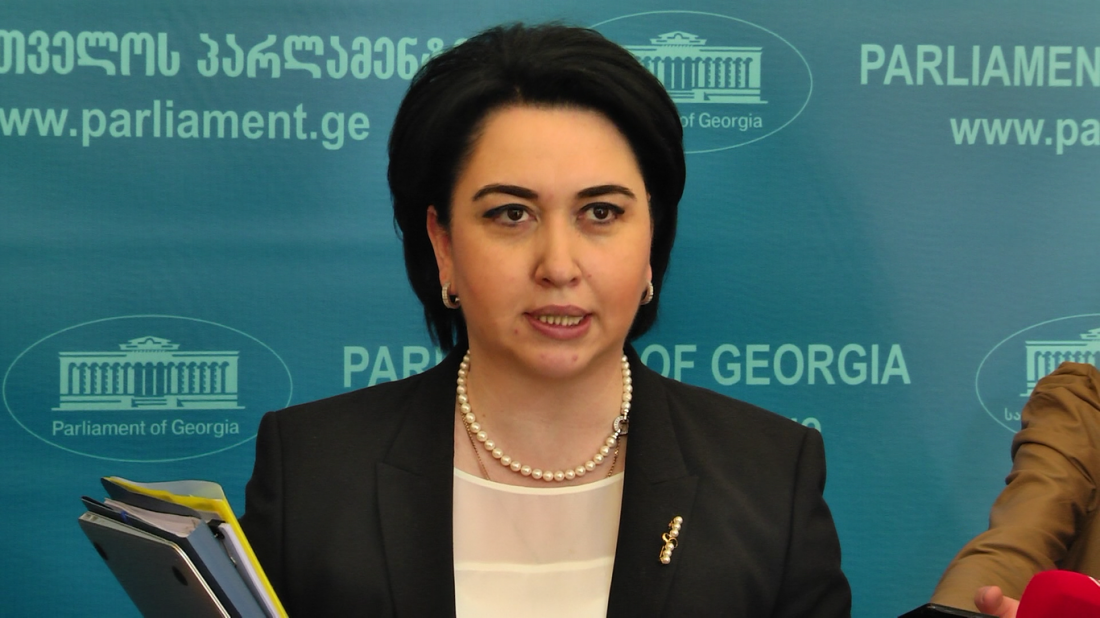

The ruling Georgian Dream Party has lost its constitutional majority in parliament after three MPs left the party and the parliamentary majority grouping over parliament’s failure to pass two bills.
Levan Gogichaishvili left the parliamentary majority on Thursday and was followed by Eka Beselia, one of the founders of Georgian Dream, the following day.
The bill submitted by the two MPs and seven others proposed a five-year moratorium on the lifetime appointment of judges to city courts and courts of appeals.
The MPs have accused candidates for Georgia’s Supreme Court of making a number of political decisions during the rule of the previous government of the United National Movement (UNM). Critics including civil society groups have said the judges are part of an influential ‘clan’ within the judiciary.
Beka Natsvlishvili, a member of Georgian Dream’s Social Democrats faction, also left both the party and the parliamentary majority on Thursday over parliament’s failure to pass his bill on Pension Reform.
The failed bill on pausing lifetime appointment of judges
‘Today I appeared on the parliamentary tribune as a member of the majority for the last time’, Gogichaishvili said on 21 February after parliament failed to adopt the bill initiated by him, Beselia, and seven other MPs.
‘Georgian Dream lost its moral authority today by supporting those who for years have been legally sanctioning whatever [former president Mikheil] Saakashvili committed against the country’, Gogichaishvili said.
Announcing her own departure the following day, Beselia said she may create a new political platform together with colleagues who were ‘protesting against what’s now happening in parliament and inside the ruling party’.

‘I will be waiting for their decision. We will continue consultations to create our political platform for the battle and the ideals we have fought for. This will happen in the nearest future. After this, we will go out to people and start a new process’, Beselia said.
She said she would go where the majority of the Georgian public stands, ‘where there is still a hope that this ominous cohabitation [with the UNM] will not drag down the most important thing for the Georgian state, for every family and citizen — the law, fair courts, and justice’.
Another of the authors of the bill, Gedevan Popkhadze, also threatened to resign. After Beselia’s statement on Friday, Popkhadze told journalists he would announce his decision on Monday.
‘I am friends with Eka Beselia and I think that her move must act as a wake-up call for Georgian Dream. This is a sign that the party has strayed too far from the values we started with’, Popkhadze said.
Parliament voted 45–17 in favour of the bill but it did not pass as it required the support of at least 76 MPs.
Citing an unnamed source, Tabula reported that prior to the vote, parliamentary chair Irakli Kobakhidze sent messages to MPs on behalf of party chair Bidzina Ivanishvili warning them not to vote in favour of Beselia’s bill.
‘Voting in favour of the bill is tantamount to leaving the party and the parliamentary majority’, the message reportedly read. Several MPs confirmed that they received such a message.
Beselia resigned as head of parliament’s Legal Affairs Committee on 27 December in an attempt to stall what she said was the ‘rushed’ confirmation of judges.
Kobakhidze, who is also the executive secretary of Georgian Dream, rebuffed criticisms of the process and hinted that the disagreement might end with Beselia’s expulsion from the party.
The appointment of controversial judges
In a July 2018 report, Transparency International Georgia described a ‘dominant [group] of judges within the judiciary […] which has the leverage to influence [other] judges.’
The dispute caused a rift within the ruling Georgian Dream party, as several rights groups warned that the appointments showed the ‘overwhelming power of the clan’ inside Georgia’s High Council of Justice (HCOJ).
On 24 December, the HCOJ sent a list of 10 nominees to parliament to be appointed to the Supreme Court for life. The HCOJ is an independent organ responsible for appointing judges, created to promote efficiency and independence of the judiciary.
In a statement on 5 February, Georgian Dream vowed to confront opponents’ plans for the ‘unlawful’, ‘revolutionary cleansing’ of judges that they said the opposition United National Movement party and their allies did not control.
‘The system has been transformed without the replacement of individuals. Those who did massively bad things then, do good things now’, said the executive secretary of Georgian Dream and Parliamentary Speaker Irakli Kobakhidze on 5 February of the judges.
A failed pension reform bill
On 22 February, parliament failed to pass a pension reform bill by the Social Democrats faction. As a result, Natsvlishvili, the deputy chairman of Social Democrats faction, left both Georgian Dream and the parliamentary majority to continue his work as an independent MP.
The current cumulative pension scheme stipulates a 6% investment of a person’s income into a personal pension account, with 2% contributed each by employees, employers, and the state.
The scheme is mandatory for those under 40 living and working in Georgia.
The government has said the cumulative pension scheme is supplementary and is not intended to replace the current fixed state pensions, which amounts to ₾200 ($75) per month. The retirement age in Georgia is 65 for men and 60 for women.
The Georgian government has insisted that the new system will provide pensioners with a ‘decent retirement’, alleviate elderly poverty, and will also boost the domestic capital market, as the pension funds will be invested within Georgia.
The bill proposed by the Social Democrats recommended a similar 2+2+2 model, the difference being that part of the accumulated money would be transferred to a ‘solidarity account’, instead of all of it going to a personal account.
‘According to our bill, the 4% provided by the government and the employer will be transferred to the solidarity account, while 2% will be transferred to an individual’s accumulative account. More than 2% can go to the personal account if a person wishes so’, Natsvlishvili said on 22 February as he presented his bill.
He insisted these changes were necessary to ensure pensions were issued on the principle of solidarity, ‘which will allow us to provide increased pensions not after 25 years, but after a year of accumulating their money’.
The current pension law has been challenged in the Constitutional Court by the Tbilisi-based rights group Georgian Democracy Initiative (GDI). The group argues that the new private saving scheme contradicts Articles 11 (right to equality) and 19 (right to property) of the Georgian Constitution.
[Read about a constitutional challenge to the pension bill on OC Media: Georgia’s new pension scheme challenged in constitutional court]









